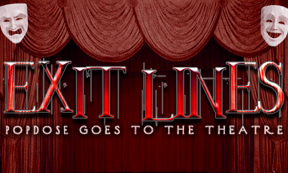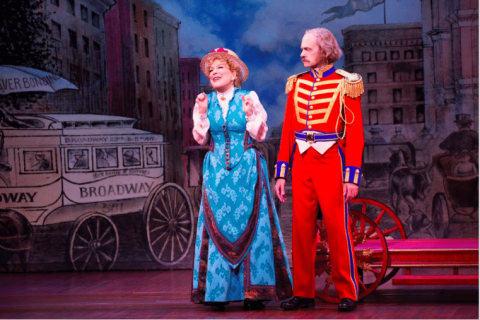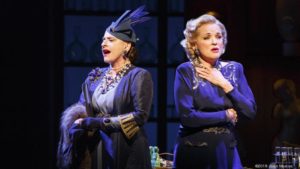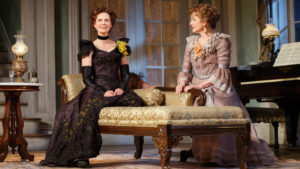 Let’s talk around the star of Hello, Dolly! for a moment. I don’t have much to compare her with: other than clips of Carol Channing performing her signature role (something she did in four Broadway productions, starting with her Tony-winning turn in 1964 and all the way up to 1995, when the 97-year-old trouper was a relative chorus gal of 75), I only know the 1969 movie. “The whole archaic big-musical circus here surrounds a Happening–Barbra Streisand–and it’s all worth seeing in order to see her,” wrote Pauline Kael. (It is, though you’ll have trouble seeing her through the elephantine production, from a time when Broadway musicals and not Marvel comics got the luxe treatment at the movies.)
Let’s talk around the star of Hello, Dolly! for a moment. I don’t have much to compare her with: other than clips of Carol Channing performing her signature role (something she did in four Broadway productions, starting with her Tony-winning turn in 1964 and all the way up to 1995, when the 97-year-old trouper was a relative chorus gal of 75), I only know the 1969 movie. “The whole archaic big-musical circus here surrounds a Happening–Barbra Streisand–and it’s all worth seeing in order to see her,” wrote Pauline Kael. (It is, though you’ll have trouble seeing her through the elephantine production, from a time when Broadway musicals and not Marvel comics got the luxe treatment at the movies.)
To paraphrase one of the famous lyrics penned by Jerry Herman, Hello, Dolly! is back where it belongs, playing to packed houses at the Shubert. If an old-fashioned production, free of teen suicide (Dear Evan Hansen), Hamilton, and Sondheim, is what you’re looking to spend your entertainment dollars on, prepare to spend lavishly, and know in advance that the money’s well spent. The show is time-warped: Jerry Zaks’ direction, and Warren Carlyle’s choreography, follow the template set by Gower Champion. Santo Loquasto’s sets and costumes, hearkening back to the turn of the 20th century, have a music hall feel to them, and are enormously appealing, as are all the technical trimmings. (No fancy projections here; retro classy is the style.) Happily, Herman is still with us, to marvel at the rebirth of his biggest hit. (His two other smashes, Mame and La Cage aux Folles, would follow.)
The casting is likewise revivifying. The show is about mismatched lovers brought together haphazardly by New York City matchmaker Dolly Levi, who, having endured widowhood, has a secret yen to marry “half-a-millionaire” Horace Vandergelder, a curmudgeonly Yonkers shopkeeper she’s shopping around. The parts of Cornelius Hackl, Vandergelder’s clerk, and Irene Molloy, the hat shop owner Dolly has promised to introduce to Horace, can be stock, and stiff, in the playing, if the actors don’t have sufficient personality to hold their own against the leads. But handsome Gavin Creel (Hair), who has a Dick Van Dyke-type facility at musical comedy, and the gorgeous red-haired Kate Baldwin (Finian’s Rainbow), are a perfect match, and their scenes hum. Second bananas Taylor Trensch (Matilda), as Horace’s other clerk, the bumbling Barnaby, and Jennifer Simard (a Tony nominee for last season’s Disaster!), playing an unlikely “date” for Horace, score in the funny business between standards. With these reserves of good cheer to draw on, the elaborate mega-number “Before The Parade Passes By” has the audience on its feet well before it closes Act I.
 Act II gives David Hyde Pierce a chance to really dazzle, with a delightful, never-before-performed “charm song,” “Penny in My Pocket,” serving as a curtain raiser, one that gives Vandergelder a chance to explain himself. But we need no apologies, as the actor waggles his mustache and does one inspired double take after another. I wasn’t sure he was right for the part (his Frasier colleague, Kelsey Grammer, would be an ideal replacement) yet I was wrong. He’s a stitch, as they might have said in olden 20th century times.
Act II gives David Hyde Pierce a chance to really dazzle, with a delightful, never-before-performed “charm song,” “Penny in My Pocket,” serving as a curtain raiser, one that gives Vandergelder a chance to explain himself. But we need no apologies, as the actor waggles his mustache and does one inspired double take after another. I wasn’t sure he was right for the part (his Frasier colleague, Kelsey Grammer, would be an ideal replacement) yet I was wrong. He’s a stitch, as they might have said in olden 20th century times.
I was sure Bette Midler was right for Dolly; who wasn’t? But, having seen her, I’m not altogether certain. Part of it may be the role, which seems to be a vessel into which the performer pours her particular gifts. Dolly is one part heart, several parts schtick–and never really a coherent character. (You get more of a sense of what the part might be from the 1958 film The Matchmaker, the adaptation of Thornton Wilder’s original comedy, which starred Shirley Booth.) Midler, of course, has a whole lot to give, and she and Hyde Pierce are sensationally funny in the second act dining scene, playing off one another perfectly and further embroidering an awkward situation caused by Dolly’s meddling. Whereas Channing grew (and grew, and grew) into Dolly, however, the 71-year-old Midler may be past it, vocally. She was noticeably hoarse when I saw her (not that her energy flagged) and the Broadway chat boards are doing everything but posting EKGs and MRIs after each performance. That said, the signature tune is what we’ve come to hear, and she delivered where it most counted.
Donna Murphy, no slouch herself, is soon to begin performing on Tuesdays, a win-win, for audiences, and for Midler, who can conserve her strength for two-show Wednesdays. I think the Divine Miss M will soon refine her take on the Divine Miss L.
 Call it Feud: Helena and Elizabeth. In real life, rival cosmetics queens Helena Rubinstein and Elizabeth Arden never met. The new musical War Paint contrives a late-in-their-long-lives meeting for them, where they wonder, briefly, if their makeup innovations were just another form of enslavement for women. It’s a silly notion–there’s no way Rubinstein and Arden, who stuffed their formulas with all kinds of junk that eventually attracted government ire, ever questioned their mission. But: It gives two great stars of musical theatre, Patti LuPone (Helena) and Christine Ebersole (Elizabeth), a chance to interact onstage. The fiction is easily forgiven.
Call it Feud: Helena and Elizabeth. In real life, rival cosmetics queens Helena Rubinstein and Elizabeth Arden never met. The new musical War Paint contrives a late-in-their-long-lives meeting for them, where they wonder, briefly, if their makeup innovations were just another form of enslavement for women. It’s a silly notion–there’s no way Rubinstein and Arden, who stuffed their formulas with all kinds of junk that eventually attracted government ire, ever questioned their mission. But: It gives two great stars of musical theatre, Patti LuPone (Helena) and Christine Ebersole (Elizabeth), a chance to interact onstage. The fiction is easily forgiven.
They share the stage at the Nederlander often enough. From much the same creative team that took us into the shadow world of Ebersole’s Tony winner, Grey Gardens (Scott Frankel, music; Michael Korie, lyrics; Doug Wright, book; and Michael Greif, director), War Paint contrasts their teeter-totter rises, falls, and rises again in vignettes. The gruff and utilitarian Rubinstein steals Arden’s husband (John Dossett)–not for her libido, but for his marketing prowess. In turn, the more patrician and “ladylike” Arden steals Rubinstein’s right-hand man (Douglas Sills) to learn her secrets. Wright weaves a good deal of fascinating social history into this one-upswomanship (Arden’s first ardent customers were suffragettes, who were eager to stand out in newspaper photos) and though the back and forth is repetitive, I learned a few things about two pioneers known more for their brands than their accomplishments. (They both disdained the vulgar upstart Charles Revson, played by Erik Liberman, who ate their lunch when his firm, Revlon, took to TV to hawk his inferior, but cheaper, products.)
Lacking the emotional underpinnings of the mother-daughter psychodrama behind Grey Gardens, which made its songs funnier and more poignant in equal measure, War Paint isn’t an outstanding musical. But the two performers give it everything they’ve got, in numbers whose lyrics they trade (“If I’d Been a Man”) and in powerful solos (toward the end, Arden has an ode to the color she made her own, “Pink,” and Helena considers the passing of time in “Forever Beautiful.”). LuPone and Ebersole are so good, so rich, and so seasoned, they’d easily sell War Paint as a straight drama. As a musical, they make it sing.
 In good times, Lillian Hellman’s The Little Foxes (1939) is a classic melodrama. That’s how it played when at age 15 I saw its most famous revival, in 1981, which starred Elizabeth Taylor as the rapacious schemer Regina Giddens, and Maureen Stapleton as her sister-in-law Birdie Hubbard, who, through the fog of alcoholism, is still hanging on to what’s left of Southern gentility. To consolidate her fortune in the early 20th century, when only sons were considered legal heirs (hello, dollars!) Regina goes to war against her duplicitous brothers and her ailing, courtly husband, Horace, who can’t be too far from his pills…
In good times, Lillian Hellman’s The Little Foxes (1939) is a classic melodrama. That’s how it played when at age 15 I saw its most famous revival, in 1981, which starred Elizabeth Taylor as the rapacious schemer Regina Giddens, and Maureen Stapleton as her sister-in-law Birdie Hubbard, who, through the fog of alcoholism, is still hanging on to what’s left of Southern gentility. To consolidate her fortune in the early 20th century, when only sons were considered legal heirs (hello, dollars!) Regina goes to war against her duplicitous brothers and her ailing, courtly husband, Horace, who can’t be too far from his pills…
In uncertain, Trumpian times, the play is more than that, as if Hellman just published her (somewhat autobiographical) broadside against greed, questionable family values, and the stain of corruption. Knowing that he’s got the goods, and trusting us to sort out the parallels, director Daniel Sullivan has staged this Manhattan Theatre Club production at the Friedman very simply, even downplaying its moment of supreme horror (no one who’s seen its 1941 film version, directed by William Wyler and starring Bette Davis, ever forgets it). One look at Regina in Jane Greenwood’s money-colored gown indicates her basic character, and the production never underlines Hellman’s urgent, heated prose.
The show’s one indulgence is stunt casting, with Laura Linney and Cynthia Nixon trading roles each performance. I’m sure it’s good value either way–but the steely Linney proved a natural to play the biggest of the foxes, briging the axe down with an assassin’s precision, and Nixon achingly good as Birdie shatters. (She has a lovely rapport with the excellent Richard Thomas, as Horace; Michael McKean and Darren Goldstein shine as the blackhearted, if not quite competent, brothers, and Francesca Carpanini lets in a ray of light as Regina’s sensible daughter.) I wish we could all just enjoy The Little Foxes as a good yarn, safely tucked away in the past, but two terrific stars and a handsome, unfussy production get it right up in our faces.





Comments